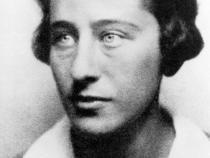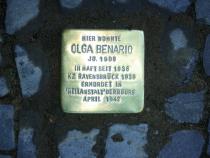Location
Innstraße 24
District
Neukölln
Stone was laid
10 December 2007
Born
12 February 1908 in München
Verhaftet
1936
in
Brasilien
Verhaftet
27 November 1936 to February 1938
in
Berlin-Moabit
Verhaftet
February 1938
in
Konzentrationslager Lichtenburg
Abgeschoben
to July 1939
in
Ravensbrück
Verhaftet
20 July 1939 to July 1939
in
Polizeigefängnis Stettin
Verhaftet
26 July 1939 to 27 July 1939
in
Polizeigefängnis Berlin
Verhaftet
27 July 1939
in
Konzentrationslager Ravensbrück
Deportation
on 23 March 1942
to
Bernburg/Saale
Murdered
23 April 1942 in der Tötungsanstalt Bernburg
“I fought for the just and the good, to make the world better. If I must now say goodbye, I promise I won’t give you any cause to be ashamed of me, not to my last breath. […] I will stay strong and determined to live to the last. Now I must sleep to gather strength for tomorrow. I kiss you both one last time.” (Olga Benario Prestes’ final letter to Luís Carlos Prestes and their daughter Anita)
Olga Gutmann Benario was born in Munich on 12 February 1908. Aged just fourteen, she became involved in the banned Schwabing Communist Youth group. Her father Leo Benario, a Social Democrat and lawyer who often represented poor clients free of charge, had fostered in her an awareness of social injustice.
In 1926, with characteristic determination and idealism, Olga left her middle-class, Jewish home in Munich to work for the Communist Party in Berlin. She was already known for her special dedication carrying out organizational work and distributing flyers, as well as for having a strong interest in military training and strategy, and a good knowledge of Marxist-Leninist theory. A hardliner, she dogmatically rejected all other political opinions, and condemned her pleasure-seeking comrades who liked to smoke and drink. But after befriending Otto Braun, a professor and experienced militant communist seven years her senior, she softened her views. Braun and Benario started cooperating in 1923 and forged a strong emotional bond over the years. But at this stage Benario rejected the concept of marriage as a bourgeois institution, designed to keep women economically dependent.
In Berlin-Neukölln, Olga Benario soon became the star of the local Communist Youth. News of her remarkable bravery spread when a sensational incident in which she was involved hit the headlines of Berlin newspapers: On 11 April 1928, she led an armed raid on the Moabit prison courtroom, succeeding in freeing Otto Braun from the dock, where he stood trial for high treason.
Equipped with false passports, Braun and Benario set off for Moscow, where they arrived a few days later. In 1931, Benario broke off their relationship because of Braun’s fits of jealousy, which she found petty-bourgeois, and devoted herself entirely to the memory of a dead man – Lenin. She was schooled in various foreign languages and trained for armed service, learning to horse-ride in the Red Army, and travelled through Western Europe performing underground work.
Back in Moscow, she was voted on to the Communist International Youth executive committee and trained as a pilot and a parachutist.
In summer 1934, she was elected by the board of the Communist International to escort and protect Luís Carlos Prestes – the legendary general of a Brazilian revolutionary army, which he led against President Artur Bernardes’ troops in the years 1925 to 1927 – on his return to Brazil. Disguised as wealthy Portuguese newlyweds, Benario and Prestes sailed to New York before flying from Miami to Brazil. During their mock honeymoon, the two actually fell in love.
Nevertheless, Benario adhered to her primary task of protecting Prestes, the leader of the failed revolution of 27 November 1935, against the dictatorial president, Vargas. The Brazilian military regime drove the Communist-led National Liberation Alliance underground and, in collaboration with the Gestapo, arrested and tortured many oppositionists.
In spring 1936, Benario and Prestes were arrested. While in prison, Benario realized she was pregnant, whereupon the conditions of her detention were slightly improved. But her hopes of being spared extradition to the Nazis, since she was an expectant mother and married to Prestes, were disappointed. Despite the protests of her fellow prisoners, the Rio de Janeiro Police Chief gave the order for Benario, now seventh months’ pregnant, to be shipped to Germany.
On arrival in Hamburg on 18 October 1936, the SS sent her straight to the Gestapo headquarters in Berlin-Moabit. Her daughter Anita Leocadia was born in prison in Barnim Straße on 27 November and stayed with her for 14 months, until her mother-in-law managed to have the child released, but not Olga. In February 1938, Benario was transferred to Lichtenburg concentration camp, from where she was sent to Ravensbrück concentration camp, via the Stettin and Berlin police prisons, where she was detained for one week, respectively. But she never gave up hope.
On 23 March 1942, she was transferred to Bernburg on the Saale. One month later, on 23 April 1942, she was gassed in the psychiatric clinic here, which had been converted by the Nazis into a “euthanasia” clinic.
See also: Imke Lode, Olga Benario – Biographie. FemBio – Frauen. Biographieforschung. target=”_blank”http://www.fembio.org/biographie.php/frau/biographie/olga-benario/ (accessed: 11.11.2013)
Olga Gutmann Benario was born in Munich on 12 February 1908. Aged just fourteen, she became involved in the banned Schwabing Communist Youth group. Her father Leo Benario, a Social Democrat and lawyer who often represented poor clients free of charge, had fostered in her an awareness of social injustice.
In 1926, with characteristic determination and idealism, Olga left her middle-class, Jewish home in Munich to work for the Communist Party in Berlin. She was already known for her special dedication carrying out organizational work and distributing flyers, as well as for having a strong interest in military training and strategy, and a good knowledge of Marxist-Leninist theory. A hardliner, she dogmatically rejected all other political opinions, and condemned her pleasure-seeking comrades who liked to smoke and drink. But after befriending Otto Braun, a professor and experienced militant communist seven years her senior, she softened her views. Braun and Benario started cooperating in 1923 and forged a strong emotional bond over the years. But at this stage Benario rejected the concept of marriage as a bourgeois institution, designed to keep women economically dependent.
In Berlin-Neukölln, Olga Benario soon became the star of the local Communist Youth. News of her remarkable bravery spread when a sensational incident in which she was involved hit the headlines of Berlin newspapers: On 11 April 1928, she led an armed raid on the Moabit prison courtroom, succeeding in freeing Otto Braun from the dock, where he stood trial for high treason.
Equipped with false passports, Braun and Benario set off for Moscow, where they arrived a few days later. In 1931, Benario broke off their relationship because of Braun’s fits of jealousy, which she found petty-bourgeois, and devoted herself entirely to the memory of a dead man – Lenin. She was schooled in various foreign languages and trained for armed service, learning to horse-ride in the Red Army, and travelled through Western Europe performing underground work.
Back in Moscow, she was voted on to the Communist International Youth executive committee and trained as a pilot and a parachutist.
In summer 1934, she was elected by the board of the Communist International to escort and protect Luís Carlos Prestes – the legendary general of a Brazilian revolutionary army, which he led against President Artur Bernardes’ troops in the years 1925 to 1927 – on his return to Brazil. Disguised as wealthy Portuguese newlyweds, Benario and Prestes sailed to New York before flying from Miami to Brazil. During their mock honeymoon, the two actually fell in love.
Nevertheless, Benario adhered to her primary task of protecting Prestes, the leader of the failed revolution of 27 November 1935, against the dictatorial president, Vargas. The Brazilian military regime drove the Communist-led National Liberation Alliance underground and, in collaboration with the Gestapo, arrested and tortured many oppositionists.
In spring 1936, Benario and Prestes were arrested. While in prison, Benario realized she was pregnant, whereupon the conditions of her detention were slightly improved. But her hopes of being spared extradition to the Nazis, since she was an expectant mother and married to Prestes, were disappointed. Despite the protests of her fellow prisoners, the Rio de Janeiro Police Chief gave the order for Benario, now seventh months’ pregnant, to be shipped to Germany.
On arrival in Hamburg on 18 October 1936, the SS sent her straight to the Gestapo headquarters in Berlin-Moabit. Her daughter Anita Leocadia was born in prison in Barnim Straße on 27 November and stayed with her for 14 months, until her mother-in-law managed to have the child released, but not Olga. In February 1938, Benario was transferred to Lichtenburg concentration camp, from where she was sent to Ravensbrück concentration camp, via the Stettin and Berlin police prisons, where she was detained for one week, respectively. But she never gave up hope.
On 23 March 1942, she was transferred to Bernburg on the Saale. One month later, on 23 April 1942, she was gassed in the psychiatric clinic here, which had been converted by the Nazis into a “euthanasia” clinic.
See also: Imke Lode, Olga Benario – Biographie. FemBio – Frauen. Biographieforschung. target=”_blank”http://www.fembio.org/biographie.php/frau/biographie/olga-benario/ (accessed: 11.11.2013)




